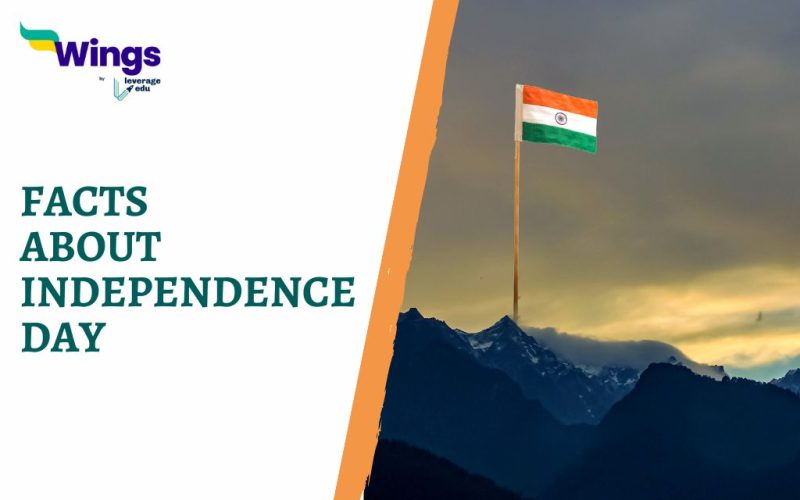Independence Day in India holds great significance as it marks the day when India was finally free from British rulers. It is celebrated every year on 15 August with cultural programs and events being organised across the country a few days before the actual day. In 2024, India will observe its 78th Independence Day. With this important day around the corner, Indians should be aware of a few important things. For instance, the difference between Republic and Independence Day, why we celebrate Independence Day, and so on. In this blog, you will read some amazing facts about Independence Day. Let’s begin.
Table of Contents [show]
Independence Day Overview
India celebrates its Independence Day with great enthusiasm and pride. Although every country has different ways of celebrating this important day, sharing sweets, greeting each other, and school competitions are common across the world.
| Aspect | Description |
| Date | August 15 |
| Significance | Marks the end of British rule in 1947 and the establishment of independent India |
| Related Event | Partition of the subcontinent into India and Pakistan (August 14-15, 1947) |
| British Rule Start | 1757 (Battle of Plassey) |
| Initial Ruler | English East India Company (100 years) |
| Later Ruler | British Raj (after the 1857 Indian Mutiny) |
| Movement Leader | Mohandas K. Gandhi (advocated non-violent resistance) |
Interesting Facts About Independence Day
Independence Day in India marks the end of British rule in 1947, and the establishment of a free and independent India. Here are the top facts about the independence day in India.
- Independence Day honours the sacrifices of brave soldiers who lost their lives for the freedom of the country.
- It coincides with the anniversary of the partition of the erstwhile Indian subcontinent into two countries, India and Pakistan.
- The struggle for Independence Day began in 1757 after the British victory at the Battle of Plassey.
- The East Indian Company ruled India for 100 years until 1857.
Also Read: 30 Happy Indian Independence Day Wishes 2024
- After the Indian Mutiny of 1857-58, the British East India Company was dissolved and replaced by direct British rule, often referred to as the British Raj.
- The Indian independence movement gained momentum during World War I and was led by Mohandas Karamchand Gandhi, who advocated for a peaceful and non-violent end to British rule.
- India received its independence at the stroke of midnight on August 15, 1947.
- While India gained independence on July 18, 1947, Lord Mountbatten, the then Viceroy of India, chose August 15th as it coincided with the second anniversary of Japan’s surrender in World War II, signifying a new beginning.
- The Indian Independence Act dissolved British rule in India and divided it into two new dominions.
- Jawaharlal Nehru, India’s first Prime Minister, unfurled the national flag at the Red Fort in Delhi on that day.
- Did you know this fact about Independence Day that India is not the only country to celebrate this day on 15 August? Four other countries – South Korea, North Korea, Bahrain, and the Republic of the Congo – also share their Independence Day with India.
- Though India achieved independence in 1947, it didn’t have a national anthem at that time. “Jana Gana Mana,” composed by Rabindranath Tagore, was officially adopted as the national anthem only in 1950.
Also Read: GK Quiz on the Independence Day of India for School Students
- While “Jana Gana Mana” is the national anthem, India also has a national song, “Vande Mataram,” composed by Bankim Chandra Chatterjee.
- The three colors of the Indian flag, saffron, white, and green, hold symbolic meaning. Saffron represents courage and strength, white signifies peace and truth, and green depicts the fertility and prosperity of the land.
- In 2024, India will celebrate its 78th Independence Day.
- The prime minister of India hoists the flag on Independence Day. On the other hand, the President of India unfurls the flag on Republic Day.
Related Blogs
| Lines on Independence Day | Facts About the Constitution of India |
| Interesting Facts about the Indian Army | Facts About India Gate |
| Independence Day Story in English | Independence Day Celebrations |
Hope you had fun reading these facts about Independence Day. If you want to know more about topics like this, then visit our Interesting Facts and General Knowledge page!
 One app for all your study abroad needs
One app for all your study abroad needs















 45,000+ students trusted us with their dreams. Take the first step today!
45,000+ students trusted us with their dreams. Take the first step today!
